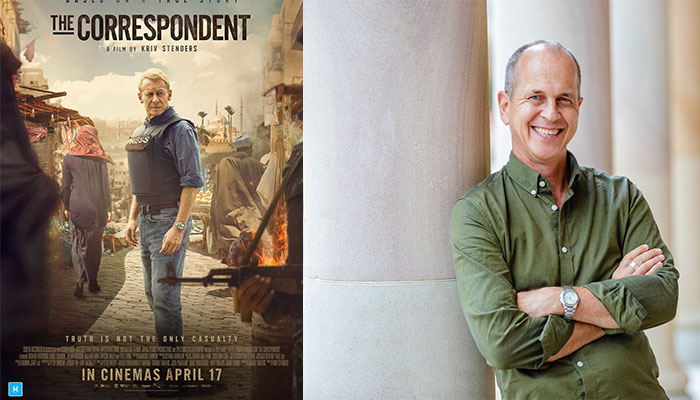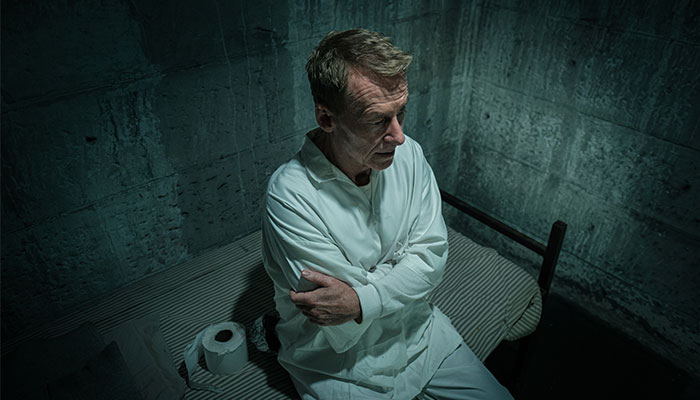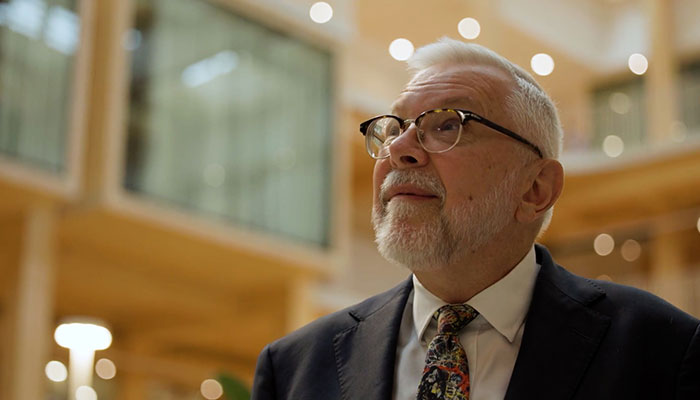It is a little disconcerting to see another person using your words, wearing your clothes, going through your experiences, and in the most public way possible.

Art imitating life: The Correspondent, depicting the imprisonment of journalist Peter Greste, pictured above right, opens in cinemas nationally on April 17.
But on April 17, Richard Roxburgh will walk across big screens around the country in The Correspondent, a movie based on the book I wrote about my time in prison in Egypt on terrorism charges. I have watched it through my fingers.
By his own admission, Roxburgh is not performing an act of impersonation – he is not trying to be “Peter Greste” – but the script lifts chunks of dialogue that took place, and the wardrobe designers found shirts and jackets remarkably similar to the ones I wore on the job back in 2013. (Even the original hat I was arrested in makes a cameo appearance.)
And while some elements of the story are necessarily ironed out for the cinema and some of the finnicky details of life inside our cells are missing, the effect is strangely discombobulating. It is a little like one of those nightmares where you hover above the earth, watching yourself head towards imminent disaster but powerless to stop it.
As weird as it feels, the movie is perhaps the ultimate fat middle finger to the Egyptian authorities who tried to take my voice away using the most egregious laws it had at its disposal.
I was working as a correspondent for the TV news network Al Jazeera, covering an unfolding political crisis. The Muslim Brotherhood had been ousted from government six months earlier, and its supporters were filling the streets demanding they be restored to power.
What happened to us was a particularly egregious example of an insidious global trend that has been eating away at freedom of speech and democratic values ever since the 9/11 attacks of 2001.
The interim administration, installed by the military that had just staged a coup, had started accusing the Brotherhood of being involved in acts of terror. So, by talking to the Brotherhood and their supporters – as any decent journalist would – two colleagues and I suddenly found ourselves charged with “advocating terrorist ideology”, being members of a terrorist group, financing terrorism, and broadcasting false news to undermine national security.
Our arrest triggered a farcical process – a very public sham trial, embarrassingly thin evidence, a conviction and seven-year sentence, global outrage and widespread protests. It only ended after enormous pressure and 400 days in prison.
But the campaign did not end there. What happened to us was an egregious example of an insidious global trend that has been eating away at freedom of speech and democratic values ever since the 9/11 attacks of 2001.
- From Mozart's sister to Madame Clicquot - the sisterhood's hidden treasures
- Gladiator II: how historically accurate is it?
That moment triggered President Bush’s “War on Terror” and gave governments the world over the opportunity to use “national security” to tighten control over what they regarded as dangerous ideas. Often, it was legitimate – nobody should be allowed to advocate for suicide bombers – but often it was not. Like when governments define ‘terrorism’ so broadly that it includes otherwise legitimate political opposition, or critical journalism.
It happened to us in Egypt, as well as places like China, Turkey and Russia. The usual suspects. But the trends were evident even in those places we thought of as bastions of democracy.
Take the United States. I had a lot to thank President Obama for – he got personally involved in the campaign to get my two colleagues and I out of prison – but he also used the Espionage Act of 1918 to lock up more journalists than all his predecessors, combined. The vast majority of those were convicted not for spying for foreign governments, but after uncovering embarrassing failures of the country’s own security and intelligence agencies.
Australia not immune to attacks on press freedom
Thankfully Australia has not been putting journalists behind bars, but we too are vulnerable to the same political winds. In fact, press freedom has taken such a hit that in the annual World Press Freedom rankings, Australia slipped from a high of 18th position (out of 110) in 2018, to 38th spot last year.

Behind bars: Actor Richard Roxburgh, pictured above, portrays Peter Greste's 400-day ordeal in an Egyptian jail in the new movie, The Correspondent.
That is largely because Australia has no explicit protection for freedom of speech or press freedom anywhere in our constitution. That gap means the government has no obligation to consider the role of good journalism in our democracy when they are passing new legislation. Nor do the courts have to factor it in when they’re dealing with cases involving journalists or their sources.
The problem is so corrosive that the organisation I now run – the Alliance for Journalists’ Freedom – believes we need a Media Freedom Act to protect the media’s crucial democratic function. The political challenge is huge. No government welcomes additional media scrutiny, but Trump’s election in the United States and his continued attacks on freedom of expression and of the press suggest such freedoms cannot be taken for granted.
When I walked free in February 2015 I believed the further we moved from 9/11, the older the language of national security would feel, and the less pressing the issue would become. But now more than a decade on, the Committee to Protect Journalists says the numbers of journalists behind bars, and of those murdered for their work, are at record highs.
If a movie and a book help draw attention to those issues and open up a few essential conversations, squirming in my seat will be worth it.
The Correspondent opens in cinemas April 17, 2025.
Peter Greste is a Professor of Journalism at Macquarie University. He is an award-winning foreign correspondent who spent 25 years working for the BBC, Reuters and Al Jazeera in some of the world’s most volatile places.



